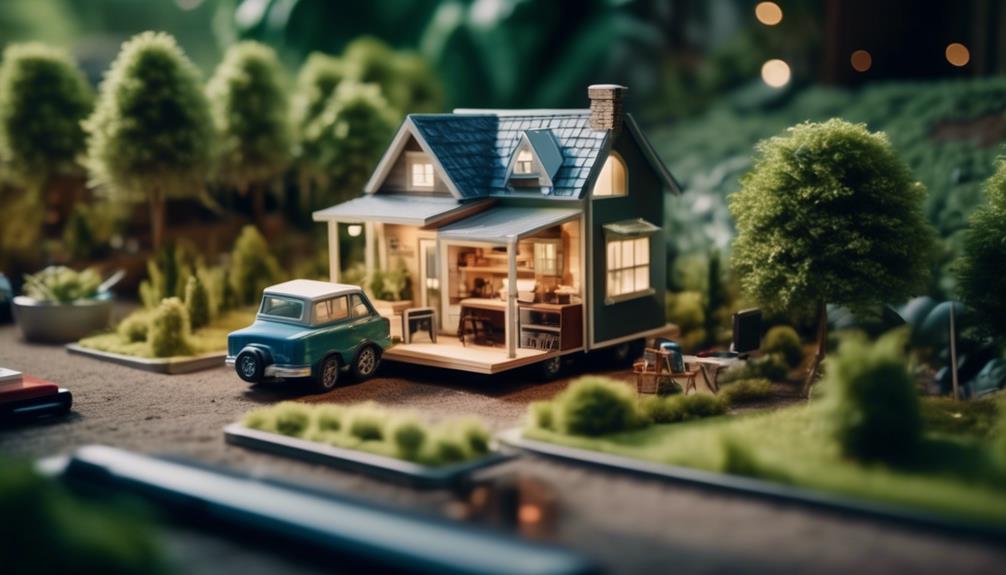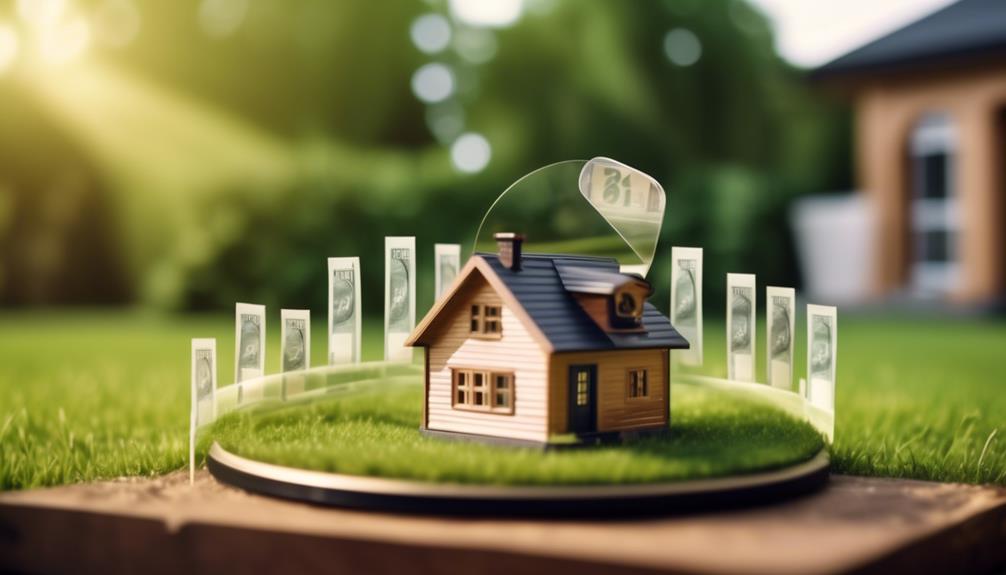In the realm of real estate, tiny homes are like bonsai trees—small in stature but capable of growing in value under the right conditions. You've probably noticed the burgeoning movement towards minimalist living and the appeal of reducing your carbon footprint. These factors play into the unique market for tiny homes, which you might be considering either as a cozy habitat or a shrewd investment.
However, the question of whether these diminutive dwellings appreciate like their larger counterparts isn't straightforward. You must weigh the influence of location, craftsmanship, and the ever-changing tides of housing trends. As you navigate the intricacies of tiny home ownership, keep in mind that the devil is in the details, and understanding these nuances could reveal whether you're standing before a sapling with the potential to grow or a charming but ultimately temporary abode.
Key Takeaways
- Tiny homes are more likely to depreciate in value, similar to vehicles, and their value can range from $28,000 to over $150,000.
- Placement and location are crucial for value appreciation, with tiny homes near urban centers and access to amenities likely to appreciate more.
- Tiny homes on permanent foundations may fare slightly better in terms of appreciation compared to homes on wheels.
- Tiny homes aligned with sustainable living trends have significant potential for appreciation, especially if well-maintained and updated regularly.
Defining Tiny Homes
Tiny homes are compact dwellings, usually under 400 square feet, designed to maximize efficiency and provide the essentials of larger traditional homes. They embody a transformative approach to living, emphasizing tiny home living as a means to declutter life and prioritize experiences over possessions.
Whether you're influenced by Tiny House Nation or the historical precedent of living in a tiny space, these homes cater to a diverse audience.
Crafted meticulously, tiny homes are built from various innovative materials, including shipping containers and school buses, ensuring each inch serves a purpose. Zoning laws can be a hurdle, but many choose to park their tiny home as an accessory dwelling unit on existing properties.
As you consider downsizing, remember that tiny homes offer a less than 400-square-feet solution to a more sustainable and adventure-filled lifestyle.
Cost Analysis of Tiny Homes
While you may be drawn to the simplistic allure of tiny home living, it's essential to consider the financial implications, as the costs can vary widely based on your choices and requirements.
Constructing a tiny home typically commands a median price of around $45,000, although this can swing from $28,000 to an upward of $150,000. These figures don't just encapsulate the structure itself; they encompass land, permits, and transportation, which are substantial contributors to overall housing costs.
Unlike traditional homes that tend to appreciate and build equity over time, tiny homes are more likely to depreciate in value, akin to vehicles. Real estate professionals recognize that financing options are narrower, and insurance needs are distinct, making tiny homes both innovative yet less expensive initially, but potentially challenging as long-term investments.
Factors Affecting Tiny Home Value

Understanding how location, market trends, and maintenance affect the value of a tiny home is crucial for prospective owners.
The Value of Tiny Homes is inherently tied to their placement; those parked on a permanent foundation near urban centers with access to amenities are likely to appreciate more significantly.
Market trends, such as higher interest rates, might deter some, but tiny homes often appeal to those seeking sustainable living, thus maintaining their desirability.
Homes Appreciate in Value when they're well-maintained, and tiny homes are no exception. Regular upkeep can ensure value over time.
Owning a tiny home comes with unique considerations; it's vital to stay informed on local regulations and market dynamics to forecast the potential appreciation of your investment.
Appreciation Trends in Tiny Homes
Generally, tiny homes on wheels often don't appreciate like their traditional counterparts, posing a challenge for owners looking to sell for a profit. In the tiny home real estate market, appreciation trends are less predictable due to several factors. Tiny homes built on a permanent foundation might fare slightly better than those built on a trailer, as they are seen more like traditional real estate. However, they still depreciate over time, generally not offering the equity growth seen with a traditional mortgage-financed home. Here's a snapshot of the current trends:
| Tiny Home Type | Depreciation Trend | Market Demand |
|---|---|---|
| On Wheels | Higher Depreciation | Limited |
| On Permanent Foundation | Lower Depreciation | Slightly Better |
| Customized | Varies | Niche |
| Standardized | More Stable | Moderate |
| Eco-friendly | Market Interest | Growing |
Investing in a tiny home is more about embracing a sustainable lifestyle than expecting significant financial appreciation in the housing market.
Investment Potential of Tiny Homes

Despite the mixed appreciation trends for tiny homes, their investment potential is influenced by several key factors. One factor is market conditions and the growing appeal of a minimalist lifestyle. Tiny homes on wheels, while akin to a manufactured home or mobile home, can circumvent some zoning restrictions and building codes, enhancing their investment viability. However, these advantages are balanced against the challenge of finding a permanent location that accommodates such structures.
Another factor to consider is the reduced utility bills and innovative designs of tiny homes. These features resonate with environmentally-conscious buyers and enhance their investment potential. In fact, a well-placed tiny home in a sought-after area can appreciate in value and rival traditional real estate investments. Therefore, a tiny home that is aligned with sustainable living trends holds significant potential for appreciation.
Maximizing Tiny Home Resale Value
To ensure your tiny home's value grows, focus on strategic upgrades that align with market trends.
The location of your property significantly influences its resale value, so choose wisely when initially investing or deciding to build.
Incorporating sustainable features and choosing high-quality materials can set your home apart, making it more attractive to future buyers.
Strategic Upgrades
Investing in strategic upgrades like energy-efficient appliances and custom storage solutions can significantly boost your tiny home's resale value. Tiny houses offer a unique lifestyle choice, and maximizing their functionality with strategic upgrades entices potential buyers. Here's how:
- Energy Efficiency:
- Solar panels reduce home costs
- High-quality insulation ensures efficient use of energy
- Customization:
- Built-in furniture leverages space
- Custom storage solutions avoid clutter
- Technology and Finishes:
- Smart home technology modernizes the living experience
- High-end finishes add luxury without bulk
As you consider the efficient use of space, remember that every square foot in your tiny home is built with potential. By choosing upgrades that reflect the ethos of Big Living and Tiny House, you're ensuring your tiny home's worth remains competitive.
Location Impact
While strategic upgrades can significantly increase your tiny home's functionality and appeal, the home's location remains a paramount factor in determining its long-term value appreciation. When you're in the real estate market for tiny homes for sale, understanding location impact is critical. If you build or park your tiny home on a piece of land with desirable features and access to amenities, you're more likely to see it appreciate in value.
| Factor | Impact on Resale Value |
|---|---|
| Proximity to Urban Areas | Higher Appreciation |
| Access to Utilities | Increased Functional Value |
| Land Regulations | Potential Appreciation Cap |
| Proximity to Amenities | Attractiveness to Buyers |
| Local Community (e.g., RV Park) | Community Appeal |
To maximize your investment, research local regulations and choose a location where residents enjoy conveniences that save money and enhance lifestyle.
Frequently Asked Questions
Do Tiny Houses Increase in Value?
You're exploring tiny living with an eye on investment, but market trends show size constraints and zoning regulations affect value. Despite cost efficiency, tiny houses rarely appreciate due to niche demand and custom designs.
Are Tiny Houses a Good Investment?
You're weighing tiny living like a stock portfolio: considering investment diversity, zoning challenges, and community impact. Custom builds offer space efficiency, but the minimalist lifestyle and reduced ecological footprint reflect more than financial flexibility.
Are Tiny Homes Hard to Resell?
You'll find tiny homes tough to resell due to niche market appeal, buyer demographics, and location factors. Financing difficulties and zoning restrictions also contribute to resale challenges, despite their design appeal and customization options.
Is a Tiny House a Depreciating Asset?
You're embracing a minimalist lifestyle with a tiny house, but it's a depreciating asset, despite the perks of mobility and space efficiency. It's the cost of pioneering sustainable living and bucking the traditional housing trend.
Conclusion
In sum, your tiny haven may indeed swell in worth, especially if it nestles in a coveted locale and you enhance its charm with smart touches.
While market whims play their role, your diminutive dwelling can be a shrewd stake in the real estate tableau, offering both a cozy nook and potential for fiscal growth.
Keep abreast of trends and maintain its allure; your pint-sized investment could yield a sizable economic embrace.

